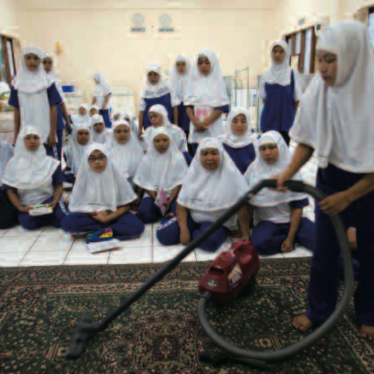(New York) - Saudi Arabia's Shura Council should ensure that proposed labor protections for domestic workers adhere to international standards and recommend their prompt enactment, Human Rights Watch today. The Shura Council is planning to discuss the draft annex to the labor law next week and to make recommendations to the Saudi cabinet, which can enact the measure into law.
Saudi Arabia's current labor law excludes domestic workers, denying them rights guaranteed to other workers, such as a weekly day of rest, limits to hours of work, and overtime pay. A 2008 Human Rights Watch report, "‘As If I Am Not Human': Abuses Against Asian Domestic Workers in Saudi Arabia," documented how domestic workers often worked 18 hours a day, seven days a week, and had little power to collect owed wages in labor disputes.
"The Saudi government has an opportunity to improve conditions for domestic workers dramatically and to serve as a model for the region," said Nisha Varia, deputy director of the women's rights division at Human Rights Watch. "It should adopt these reforms quickly to prevent future cases of abuse."
The Shura Council is a consultative body. It debates draft legislation presented by the cabinet and, once approved, the draft law goes back to the cabinet which can make further changes and enact it into law.
Approximately 1.5 million women from Indonesia, Sri Lanka, the Philippines and other countries are employed as domestic workers in Saudi Arabia. Saudi authorities and the foreign missions of domestic workers' home countries receive thousands of complaints of labor exploitation or abuse each year. Excessive workload and unpaid wages, for periods ranging from a few months to 10 years, are among the most common complaints.
Many more cases probably go unreported, given domestic workers' isolation in private homes, employers' ability to have workers summarily deported, and migrants' lack of information about their rights.
"The Shura Council should ensure that the proposed reforms provide domestic workers the same rights accorded other workers under the labor law," said Varia. "Working in private homes does not mean they should lose basic protections, and guaranteeing these rights by law can be especially important since they work out of the public view."
Domestic workers' rights are further compromised by the restrictive kafala (sponsorship) system, which ties migrant workers' visas to their employers, and means employers can deny workers the ability to change jobs or leave the country. Human Rights Watch interviewed dozens of domestic workers who said their employers forced them to work against their will for months or years. In other cases, domestic workers face forced confinement in the home, or physical and sexual abuse.
"Comprehensive reforms by the Saudi government are long overdue," said Varia. "Extending the labor law is an important first step the Saudi government can take to fight labor exploitation and violence against domestic workers."







